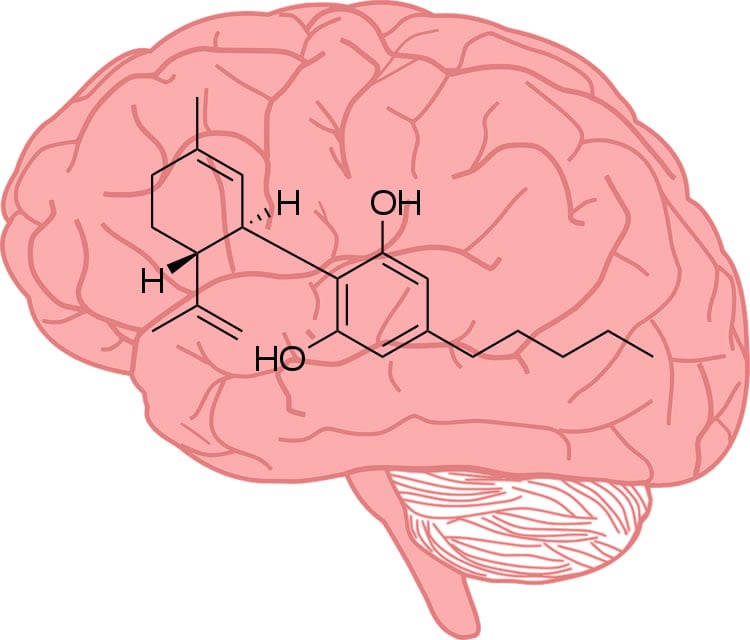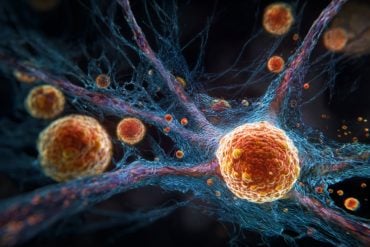Summary: Cannabidiol may be able to bypass the blood-brain barrier to effectively deliver medications directly to the brain.
Source: ACS
Cannabidiol (CBD), a non-psychoactive compound in cannabis, is being touted as beneficial for many health conditions, ranging from anxiety to epilepsy. Although much more research is needed to verify these claims, scientists have now shown that CBD could have a different use as a “Trojan horse”: helping slip medications across the blood-brain barrier (BBB) and into mouse brains.
The researchers report their results in the ACS journal Molecular Pharmaceutics.
The BBB consists of a layer of tightly linked cells that line capillaries in the brain, preventing substances from exiting the blood and entering the brain. However, the BBB does permit some molecules to pass, such as glucose and certain amino acids and neurotransmitters. For example, a class of neurotransmitters called endocannabinoids bind to proteins called cannabinoid receptors in the BBB, and the receptors help transport the molecules across the barrier and into the brain.
Ana Torres-Suárez and colleagues wanted to make use of this system to sneak drug nanocarriers into the brains of mice.
To do so, the researchers attached CBD, which resembles endocannabinoids made by both mice and humans, to the outside surfaces of lipid nanocapsules. Instead of loading the nanocapsules with a medication, the researchers packaged them with a fluorescent molecule so they could track the particles.

In experiments with human brain cells that mimic the BBB, the researchers showed that the CBD-displaying nanocarriers caused more of the fluorescent molecule to pass through the cells than nanocarriers of equal size that lacked CBD. Similarly, when injected into healthy mice, the CBD-nanocapsules targeted about 2.5 times more of the fluorescent molecule to the animals’ brains.
Funding: The authors acknowledge funding from the Complutense University Research Fund, the Santander-UCM Research Group Parenteral Administration of Drugs and the Spanish Ministry of Education.
Source:
ACS
Media Contacts:
Katie Cottingham – ACS
Image Source:
The image is in the public domain.
Original Research: Closed access.
“Cannabidiol Enhances the Passage of Lipid Nanocapsules across the Blood–Brain Barrier Both in Vitro and in Vivo”
Juan Aparicio-Blanco, Ignacio A. Romero, David K. Male, Karla Slowing, Luis García-García, and Ana I. Torres-Suárez. Molecular Pharmaceutics doi:10.1021/acs.molpharmaceut.8b01344
Abstract
Cannabidiol Enhances the Passage of Lipid Nanocapsules across the Blood–Brain Barrier Both in Vitro and in Vivo
Diseases affecting the central nervous system (CNS) should be regarded as a major health challenge due to the current lack of effective treatments given the hindrance to brain drug delivery imposed by the blood–brain barrier (BBB). Since efficient brain drug delivery should not solely rely on passive targeting, active targeting of nanomedicines into the CNS is being explored. The present study is devoted to the development of lipid nanocapsules (LNCs) decorated with nonpsychotropic cannabinoids as pioneering nonimmunogenic brain-targeting molecules and to the evaluation of their brain-targeting ability both in vitro and in vivo. Noticeably, both the permeability experiments across the hCMEC/D3 cell-based in vitro BBB model and the biodistribution experiments in mice consistently demonstrated that the highest brain-targeting ability was achieved with the smallest-sized cannabinoid-decorated LNCs. Importantly, the enhancement in brain targeting achieved with the conjugation of cannabidiol to LNCs outperformed by 6-fold the enhancement observed for the G-Technology (the main brain active strategy that has already entered clinical trials for the treatment of CNS diseases). As the transport efficiency across the BBB certainly determines the efficacy of the treatments for brain disorders, small cannabinoid-decorated LNCs represent auspicious platforms for the design and development of novel therapies for CNS diseases.







